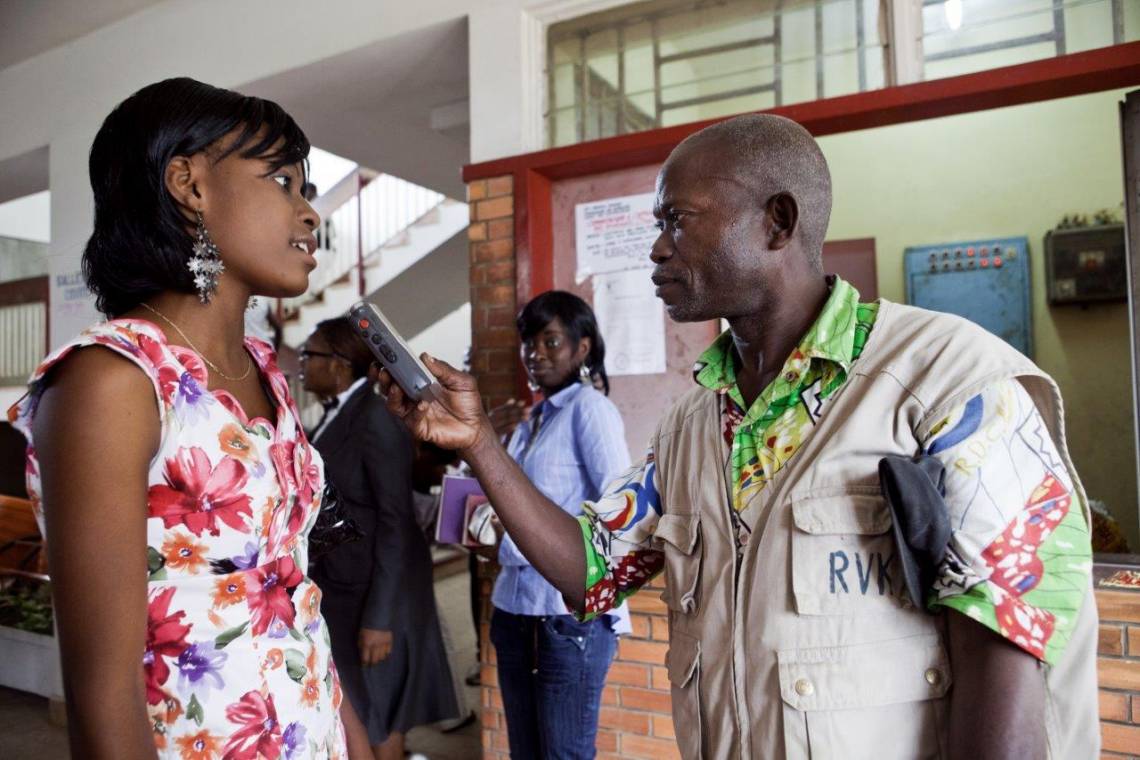Fondation Hirondelle supports 105 radios in the Democratic Republic of Congo with training, programmes for broadcast and revenue generating activities. What is the impact of this support? Here is some feedback gathered during the past year.
Donatien Muamba Mudila, director of Radio Télé Fraternité / Bwena Muntu, in the province of Kasai-Oriental: “We have received more than 1,000 US dollars in cash from awareness campaigns led by Hirondelle Communication. This sum covered more than 10% of our management costs and represents about 13% of our local revenue. It allowed us to:
- Make up the salaries of our employees (from May to September 2017);
- Pay for some equipment and supplies for the technical and editorial teams;
- Organize the 27 September 2017 Board meeting.
‘My Body My Dignity’ is a programme (editor’s note: produced by Fondation Hirondelle in the DRC and broadcast by the network of partner radios) that has made a mark especially in schools and universities. We found young girls engaged in discussion and exchanging advice amongst themselves on the basis of messages from flyers distributed and spots that they followed on the radio.
“I was not interested in radio before, I always preferred television,” says one female student. “But the fact that you gave the times and radio frequencies in the flyers allowed me to know when it was time to listen to these programmes. If I am not at home to turn on the TV, I use my telephone with headphones, even if I am travelling.”
Serge Nguizani, coordinator of Centrale FM radio in Kinshasa: “We have bought a Zoom audio (digital recorder) and some Dictaphones for our editorial team, carried out maintenance on our equipment and paid the bonuses of our technicians. This money (from communication campaigns developed by Fondation Hirondelle) represents about 15% of our monthly revenue.
With regard to the My Body My Dignity programmes, some of our listeners asked in our morning shows if the programme was broadcast every day and said that if possible they should be able to call in and ask the doctor questions directly about the causes and consequences of sexual violence.
Our partnership has helped us a lot not only financially but also with quality productions that have enhanced our programming. So it is very advantageous for us, and we hope that it will continue for a long time.
Léon Nzita, director of Radio Boma, in Boma, western DRC: “The partnership that we have with Fondation Hirondelle helps us a lot to improve the quality of our work, as many listeners say we have. Fondation Hirondelle is a partner that brings us both money and expertise. This partnership has helped us to:
- Raise the income of our employees a bit
- Buy a generator to replace the one that broke down
- Repair our transmitter which had developed a fault
- Organize training for our journalists inspired by the Fondation Hirondelle model
- Boost our confidence and credibility with our audience and other socio-political actors.
Mrs. Gertrude TSUNGU DIAMBU, an inhabitant of Boma, called us in August and told us the following: “When listening to the WOMEN AND ELECTIONS programmes (produced by the Fondation Hirondelle team in the DRC and broadcast by its partner radios), I really enjoyed listening to the testimonies of personalities like Jeanine Mabunda and company. It encouraged me to enrol to become a future candidate, because the others were just like me.”
Jacques Kikuni, director of radio Muungano in Beni, eastern DRC: “This partnership has brought us closer to our audience. I must also say that the quality of the programmes and the content broadcast on our radio have helped in a big and lasting way to change the behaviour of some of our listeners in the Beni region. Productions dealing with democracy, civic education, human rights, gender, women, agriculture, civic rights, health and other things have educated many listeners, because our radio is in touch with the big events affecting our country.
This partnership also helps to improve content quality. We are proud to have obtained and broadcast content produced with more professionalism. It has also had a positive effect on our cash flow. We have been able to change some of our technical equipment. Over the past years, we were also able to replace our IT kit, give the editorial team two laptops and give the broadcasting studio an IT kit.”




